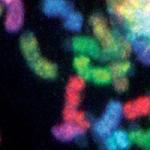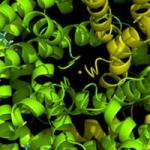
Research Topics
Proteolytic control of DNA replication and genome stability
The Machida Lab studies how cells protect genome integrity during DNA replication, with a focus on proteolytic mechanisms that remove barriers to fork progression. We investigate how specialized proteases such as FAM111A and SPRTN respond to DNA-protein obstacles, and how their activity contributes to genome maintenance, genetic disease, cancer, and antiviral defense. Using biochemistry, structural analysis, cell-based models, mouse genetics, and infection studies, we examine how these enzymes are regulated under normal conditions and dysregulated in the context of disease. Our work spans three connected research areas: DNA replication stress, human genetic syndromes, and host-pathogen interactions.
1. DNA Replication Stress and Proteolytic Repair
We investigate how cells overcome protein obstacles during DNA replication by activating specialized proteases. Our work focuses on FAM111A, a trypsin-like serine protease, and SPRTN, a zinc-dependent metalloprotease, both of which promote replication fork progression in the presence of topoisomerase 1 cleavage complexes (TOP1ccs), PARP1-DNA complexes, and DNA-protein crosslinks (DPCs). These obstacles are also the basis for anticancer drugs such as camptothecin and PARP inhibitors, linking our research to therapeutic mechanisms and chemotherapy sensitivity. We study how these enzymes are activated, regulated, and function at replication forks, and how their dysfunction alters replication dynamics and drug response.
2. DNA Repair and Human Disease
Mutations in the genes encoding FAM111A and SPRTN cause distinct genetic syndromes that highlight the physiological importance of proteolytic DNA repair. SPRTN mutations underlie Ruijs–Aalfs syndrome (RJALS), a progeroid disorder characterized by genome instability, premature aging, and early-onset liver cancer. Our mouse models of SPRTN insufficiency reveal spontaneous tumor formation and accumulation of TOP1ccs, providing in vivo evidence that SPRTN suppresses tumorigenesis by promoting DNA-protein crosslink repair. In contrast, mutations in FAM111A cause Kenny–Caffey syndrome type 2 (KCS2) and Gracile Bone Dysplasia (GCLEB), developmental disorders characterized by skeletal abnormalities, hypoparathyroidism, hypocalcemia, and short stature. We have shown that disease-associated FAM111A mutations increase autocleavage activity, indicating altered protease regulation. We use disease-associated mutations and model systems to uncover how dysregulated protease activity affects development, aging, and cancer risk.
3. Host-Pathogen Interactions and Antiviral Defense
In addition to its role in DNA replication, FAM111A also helps defend cells against viruses. Our work has shown that the poxvirus protein SPI-1, a serpin-family protease inhibitor, blocks FAM111A by forming a covalent, irreversible complex with its protease domain. This mechanism is characteristic of serpin-mediated protease inhibition and reveals how poxviruses evade host restriction. We investigate how specific changes in SPI-1 affect its ability to inhibit FAM111A and promote virus replication, uncovering a unique strategy viruses use to escape cellular defense.
Biography
Dr. Yuichi Machida earned his Ph.D. in biotechnology from Nagoya University in Japan. He conducted postdoctoral research with Dr. Anindya Dutta at Brigham and Women’s Hospital and the University of Virginia, where he studied DNA replication and repair. He began his independent research career at Mayo Clinic in 2008 and was later promoted to associate professor. Dr. Machida’s research has helped define the roles of SPRTN and FAM111A in DNA-protein crosslink repair and replication stress response. Since 2022, he has served as a Senior Investigator in the Developmental Therapeutics Branch at NCI, where his lab continues to investigate how proteolytic regulation of DNA replication contributes to cancer biology, genetic disease, and antiviral defense.
Related Scientific Focus Areas




Molecular Biology and Biochemistry
View additional Principal Investigators in Molecular Biology and Biochemistry

This page was last updated on Wednesday, December 3, 2025